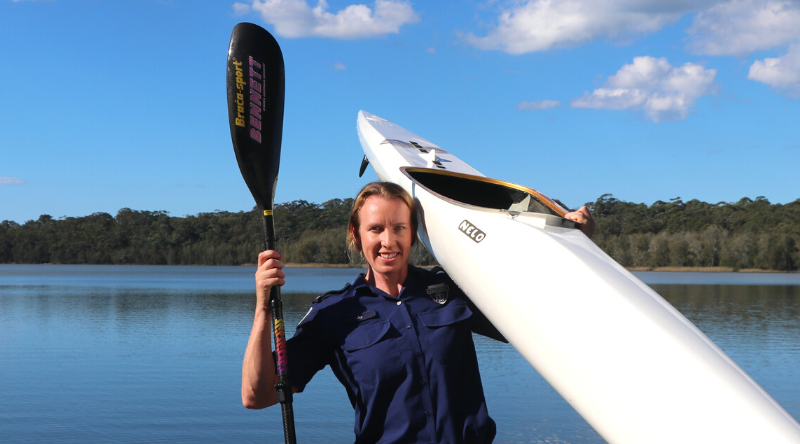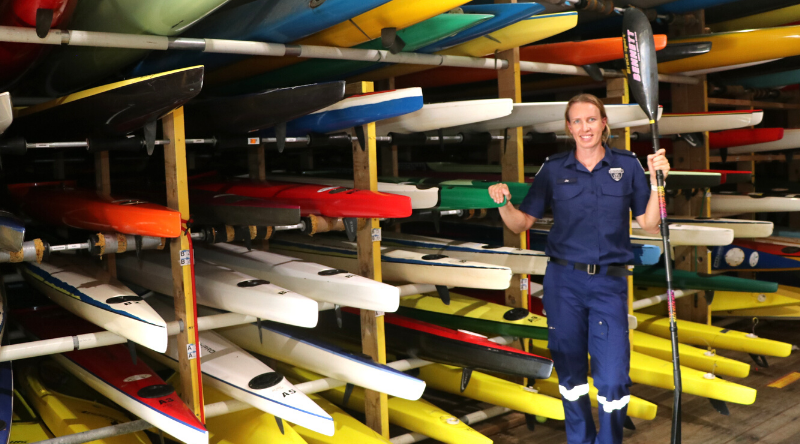
Every Saturday afternoon Jo Brigden-Jones gets three or four hours from her busy week where she has the chance to take advantage of some well-earned downtime.
The thing is, she hates it.
Can’t stand it. If not for her body telling her to use that time to relax, Jo would instead be doing what she does during the rest of the week: taking on challenges and overcoming them. “I’m not very good at staying still,” the Tweed Heads paramedic said.
“I don’t really know what to do with myself during that time off.”
The role of being a paramedic can present unique challenges on a regular basis.
Jo knows this, it’s what she loves about the job. The thrill of a challenge is also why she spends time during the week baking cakes for customers’ special occasions as part of her growing business, Elite Cake Co.
And it’s also this desire to face a challenge head-on which has been the driving force behind the kayaker’s qualification for the Tokyo Olympics, which comes nine years after her first Games, in London.
Simply put, Jo’s unwavering mindset is different from most people, and that of most Olympians.
She narrowly – and controversially – missed out on selection to the Rio Olympics, which was set to be her swansong before dedicating her work-week entirely to being a paramedic.
At about the same time, Jo had just earned her qualification as an ambo and she was initially resolute in her decision to not have another crack at Olympic glory.
The prospect of training up to three times a day, while working full-time in a high-energy role as a paramedic, would understandably be one challenge too many for most Olympians facing the prospect of competing against the best kayakers in the world at the aged of 33.
But, almost as quickly as when she powered to victory in two races (K1 200m, K2 200m) at last year’s national championships, Jo had a change of heart.
Despite working full-time, building up a cake business and constantly managing injury niggles that are part and parcel of being an elite kayaker for 20 years, Jo yearned for the opportunity to push for Tokyo and test herself once more.
“I had no intention of going to the Olympics when I started the job, but I still really enjoyed going out for a paddle,” she said.
“I was paddling once a week when I started and I guess it progressed from there and my competitive nature kicked in.
“I thought it would be a good challenge to see if I could fit in my paramedic career and training together, and I guess I surprised myself along the way in that I could actually do it.
“I definitely didn’t plan this… but I think it has been really special to do both.”

Jo, who is currently working part-time in the lead-up to the Olympics, said her two careers, as a paramedic and a kayaker, actually complement one another.
“Definitely with those high-pressure situations,” she said.
“When I sit on the start line of a race I’ve got the adrenaline pumping around and I’m nervous, thinking about what’s ahead of me. It’s the same when you’re tasked to a big job, you know the pressure is going to be on and you’ve got a sick patient in front of you.
“Those skills I’ve learnt in paddling have helped me to stay calm on the job and focus on the patient… and it works vice-versa too.
“Being a paramedic has also helped to give me a greater perspective on community and life (away from kayaking), allowing me to explore different areas and passions that I have.”
Jo said she has received incredible support from her paramedic family, which includes Tweed Heads Station and Artarmon Superstation, where she formerly was based at before transferring closer to her Gold Coast training centre.
And so far as preparation, Jo said her multifaceted work-life has put her in good stead for what’s ahead.
“The Olympics are always tough, always the unknown and I love that we have to rise to the occasion while competing there - the pressure is definitely going to be on,” she said.
Jo is scheduled to compete in the K2 500m (heats begin on August 2) and the K4 500m (heats begin on August 6).
